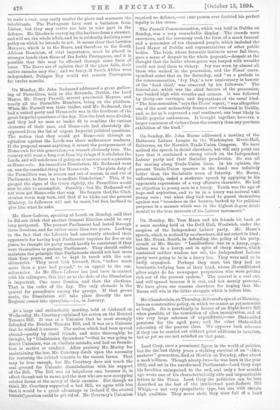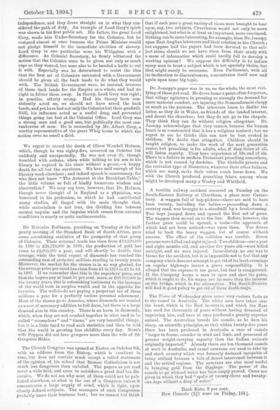Lord Grey, once a prominent figure in the world of
politics, but for the last thirty years a striking survival of an " older, austerer" generation, died at Howick on Tuesday, after about a week's illness. Though ninety-two—he was born in the year 1802, and sat in the unreformed Parliament—Lord Grey kept his faculties unimpaired to the end, and only a few months ago wrote one of his characteristically able and impracticable lettere to the Times. Lord Grey the politician can be best described as the last of the intellectual post-Reform Bill Whigs,—a not very sympathetic type, but one with Certain high qualities. They never stole, they were full df a hard independence, and they drove straight on in what they con- sidered the path of duty. An example of Lord Grey's spirit was shown in his first public act. His father, the great Lord Grey, made him Under-Secretary for the Colonies, but he resigned almost at once because the Prime Minister would mot pledge himself to the immediate abolition of slavery. Lord Grey in. one particular wore his Whiggism with a 'difference. As Colonial Secretary, he firmly withstood the notion that the Colonies were to be given not only as much (rope as they wanted, but were also to be handed a knife to cut it with. Especially was he determined to resist the idea that the first set of Colonists entrusted with a Government should be given all the back lands to do what they would with. The British Government were, he insisted, trustees of those back lands for the Empire as a whole, and had no \right to fritter them away. In theory, Lord Grey was right; in practice, utterly wrong. Had his theory been con- sistently anted -on, we should not have saved the back 'lands, and yet have lost not only the Colonies but their goodwill. Still, his influence acted as a useful drag, and prevented things going too fast at the Colonial Office. Lord Grey was Q. strong man and a good one, but politically the most can- tankerous of men. He is succeeded by Mr. Albert Grey, a worthy representative of the great Whig house to which the cation owes no small a debt.



















































 Previous page
Previous page